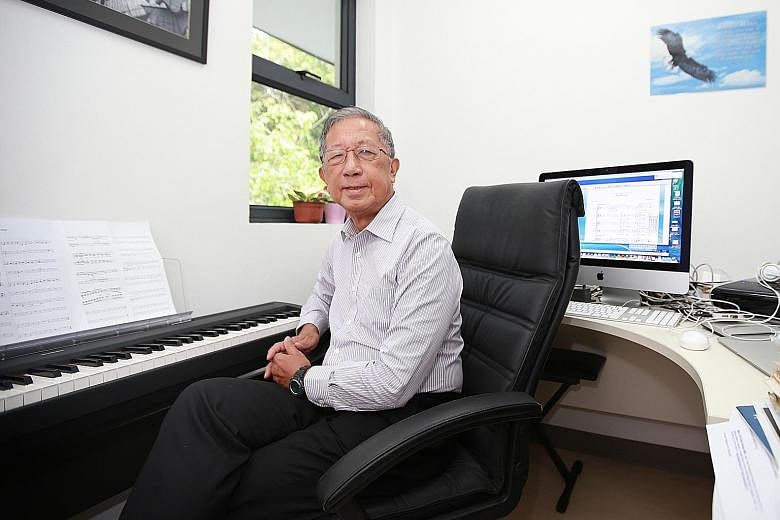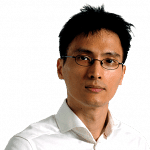They say the left brain is for science and the right brain is for art.
But to Professor Bernard Tan, it does not matter.
The National University of Singapore don, 73, is a physicist by day and music composer by night.
Writing music may seem very different from scientific research but, actually, he pointed out, "both are creative processes".
Prof Tan, an expert in the science of sound, was the acoustician for Singapore's Victoria Concert Hall in the 1980s. Today, he pushes the frontiers of research on the electronic synthesis of musical sounds.
-
The journey of an engineer-musician
-
Born in Singapore during the Japanese Occupation, Professor Bernard Tan, 73, attended the Anglo-Chinese School.
Since then he has worn two hats, as an engineer and a musician.
He became a chartered engineer in 1972 after completing his doctoral studies at Oxford University, and was elected a Fellow of Trinity College London in composition in 1989.
Besides being a professor of physics at the National University of Singapore (NUS) and holding key administrative appointments there over the years, he served as acting head of the university's department of music in the late 1970s.
Prof Tan has nurtured some 10 PhD students, and taken numerous others under his wing.
In 1998, he received an award for innovative teaching from the university's faculty of science, for his contributions in setting up the Special Programme in Science, a multi-disciplinary research and mentorship programme for undergraduates.
He has also received several national awards, including two Public Service Stars in 1990 and 2001.
He is now director of the Centre for Maritime Studies at NUS, as well as chairman of the management boards of the Centre for Remote Imaging, Sensing and Processing and the Singapore Synchrotron Light Source.
Prof Tan plays dual roles in the corporate realm too, having sat on the board of directors of organisations from Keppel Corporation to the Singapore Symphony Orchestra.
Lin Yangchen
"The whole point of research is to discover what is 'not there'. You've got a plan, but your creative impulse, which you didn't know was inside you, has a different plan... that's what creativity is all about," he said.
"The physicist in me likes formal structures," said Prof Tan, referring to the so-called sonata form that many composers use to structure their music into coherent sections that introduce musical ideas, develop them and then conclude the piece.
Yet, he added, "if the music takes me to a place where it violates a form, so be it".
Prof Tan actually does not find composition enjoyable. In fact, it is a struggle for him.
He learnt to play the piano when he was young and got a teaching certificate, but had no formal training as a composer.
He began writing music only in his 20s, composing songs for his university choir and church choir at the Straits Chinese Methodist Church, now the Kampong Kapor Methodist Church.
Today, his musical oeuvre has expanded to some 75 pieces, including symphonies, concertos, organ works, chamber music and songs.
"Most people say my music is very direct in what it wants to say. I don't beat around the bush. I'm a scientist - maybe that affects it."
Despite the affinities between musical composition and scientific research, Prof Tan does not find scientific data a particularly inspiring source of musical ideas.
"Real music has much deeper motivations," he said.
He gave the example of The Planets, a famous set of orchestral pieces written by English composer Gustav Holst.
"Holst was not an astronomer. But he wrote in a period when there was intense interest in planetary things - Pluto had been discovered and all that.
"He wrote for that because of the romantic associations of the planets and how he felt."
For Prof Tan, one source of inspiration is the poetry of Cultural Medallion winner Lee Tzu Pheng.
In 1987, he wrote a choral piece based on her poem My Country And My People.
"The poem is very famous because it expresses exactly the kind of uncertainty that people of my generation felt," he said, adding that the music was written in an "angry and avant garde" style.
Originally a solid-state physicist, Prof Tan later gravitated towards acoustics partly because of his interest in music.
He now specialises in another way of creating music - analysing sounds from musical instruments and using that to synthesise the sounds electronically.
"Today, the method of synthesis is sampling, which is a bit of cheating. It's cheating because it's a recording of a real oboe (instrument). It's not really a synthesis."
Scientists are now using computers to model the physical processes that actually take place when a musical instrument is played, such as the movements of a player's lips, to try to reconstruct the waveforms of the sound.
It is still very difficult to make the machines imitate the nuances of a real musician, because a given note sounds identical every time it's produced by a synthesiser, he added.
"We'll get close to it but I hope we don't reach that point."
Nevertheless, Prof Tan said it is important to identify one's passion and learn everything one can about it.
"That's how great problems are solved, that's how great music is written, that's how great research is done."
But it does not stop here. One should go even further and contribute to the community, he added.
As chairman of the Singapore Symphony Orchestra's artistic advisory committee, he helps get music out to the masses, while his past service on the board of Keppel Corporation was an opportunity for an academic voice to be heard in industry.
"You have to be involved in society, as a scientist and also as a musician. You can't be isolated," he said.


